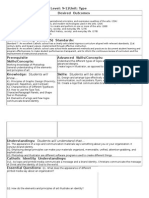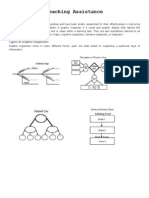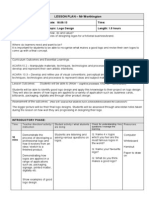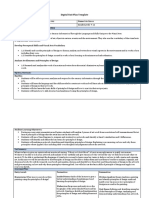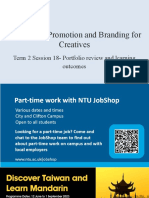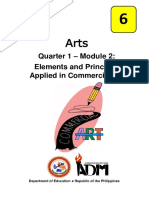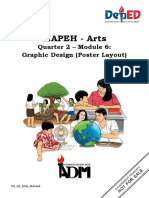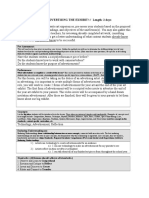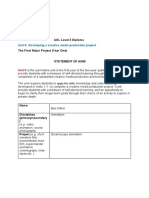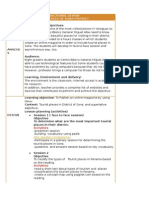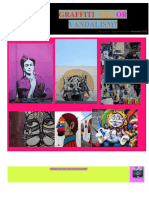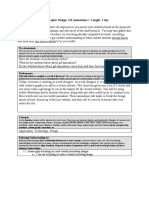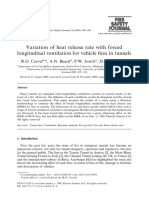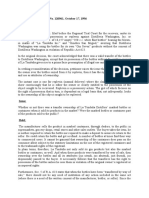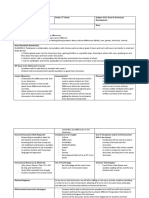Schranz Unit Espansionlesson
Schranz Unit Espansionlesson
Uploaded by
api-238651347Copyright:
Available Formats
Schranz Unit Espansionlesson
Schranz Unit Espansionlesson
Uploaded by
api-238651347Original Title
Copyright
Available Formats
Share this document
Did you find this document useful?
Is this content inappropriate?
Copyright:
Available Formats
Schranz Unit Espansionlesson
Schranz Unit Espansionlesson
Uploaded by
api-238651347Copyright:
Available Formats
Level 2: ART 309 Unit Expansion & edTPA Student Teaching
Deconstructed Identity
Central Focus Grade Level Class Size Time Class Demographics Personal Logos 8th 25 4 weeks
National Visual Arts Standards Va:CR1-8a, VA:Cr2-8b, VA:Cr3-8a, VA:Cn11-8a Common Core State Standards Addressed
UNIT OVERVIEW Students will complete a zentangle to learn about line. They will learn how to use the pen tool in Adobe Illustrator, and explore gestalt principles to make a logo design. Forms Frames Conceptual Framework 2D Cultural Artwork 3D Subjective Artist Structural Audience 4D Postmodern World
Student Prior Knowledge and Conceptions Geometric verses organic shape, basic color principles, recognizing and utilizing line, pattern, and compositional strategies. Common Errors or Misunderstandings It is easy to make errors using the pen tool. May students may not be as aware of the imperfections that dragging an anchor point to far creates. - To solve this error, I will make sure student use resources like YouTube. There are never ending videos on this site that teach people how to use adobe programs. Students will watch a video and write notes about what they learned. Students may not understand the duplicity of some Gestalt principles. -I have created a handout, and a video to further demonstrate each principle. Interdisciplinary Connections Communications: visual communication mixed with verbal communication, being able to sell a logo to a customer. English: Reading and interpreting artist handouts, writing and proof reading artist statements UNIT LEARNING OBJECTIVES As a result of this lesson, students will be able to: 1. Document any and all stages of digital art making processes completed in Adobe Illustrator. 2. Create one unique personal logo design I Adobe Illustrator that shows an awareness of artistic ethics (appropriation, fair us e, copyrightetc) 3. Complete an in-progress self critique, listing at least one revision you would make to your 10 sketches. 4. Write an artist statement that includes: a definition of the word chosen and why it was chosen; strengths and weaknesses; two ways the logo can be used in society; an explanation of all color choices. Why are the learning tasks for this lesson appropriate for your students? (Cite specific, theoretical principles and/or research-based best practices in your answer.) How will you structure opportunities for THEORETICAL PRINCIPLES AND/OR RESEARCH-BASED BEST PRACTICES Max Wertheimer: -Gestalt Principles: The human mind views images as a whole, not in pieces. This lesson
STUDENT INTERACTIONS Think Pair share for Gestalt Principles. Jigsaw for logo information, artists
Level 2: ART 309 Unit Expansion & edTPA Student Teaching
students to work with partners or in groups? What criteria will you use when forming groups?
Drawing names on popsicle sticks.
4x4 white card stock Adobe Illustrator Scanner
TEACHER MATERIALS Student progress checklist
Remember to include all technology tools, photocopies, posters, images, etc.
4x4 white card stock Adobe Illustrator Scanner
STUDENT MATERIALS Filippo Marinetti logo, Carolyn Davidson, and gestalt principles worksheets
Key Artists Key Artworks Key Critical Questions
ARTISTS IN CONTEXT List at least 6 diverse artists Artist, Artwork Title, Year (list at least 2) 1. How does the placement of the words in Zang Zumb Zumb make you feel? How do you read it? 2. What influence has Filippo Marinettis work had on other designers? 3. What other meanings do we attach to a Swoosh (check mark) symbol? 4. How has the meaning of the symbol changed in different context? VOCABULARY AND LANGUAGE ACQUISITION Gestalt Principles: rules of the organization of visual imagery Line: a narrow mark, or band Logo: a symbol or other design adopted by an organization to identify its products, uniform, vehicles, etc. Branding: the promotion of a particular product or company by means of advertising and distinctive design. Graphic design: the art or skill of communication by means of combining text and pictures to create advertisements, magazines, or books. Italian Futurism: a movement in art, music, and literature begun in Italy about 1909 and marked especially by an effort to give formal (elements and principles) expression to the dynamic energy and movement of mechanical processes Zentangle: A form of drawing created from the use of structured patterns Graphic designers: visual communicators who create advertisements for companies. analyze, critique, describe, interpret, Reading Writing Listening Speaking Syntax Discourse 1. Write an artist statement, peer proof reading (syntax) 2. In progress critique in pairs/small groups (discourse) 1. Artist informational sheets on Filippo Marinetti, Carolyn Davidson, and the gestalt principles. 2. Worksheet: includes famous logos, students will describe and interpret meaning, and analyze and critique the artists use of gestalt principles.
Vocabulary
Language Functions Language Modes Language Demands Language Tasks and Activities Language Supports
SPECIAL PRE-INSTRUCTION PREPARATIONS What special preparations need to be made by the teacher before beginning this unit? Schedule a field trip? Schedule a guest speaker? Have students compile/collect special supplies? Have specific equipment on hand? Etc. ACCOMODATIONS FOR SPECIFIC DIVERSE LEARNERS Students with Written instruction for each student, as well as for the classroom, will be provided. IEPs or 504s Students can scan in their sketches and trace them with the pen tool if they need more guidance. Adaptations and Accommodations Written instruction for each student, as well as for the classroom, will be provided. Students can scan in their sketches and trace them with the pen tool if they need more guidance. [rather than creating them from scratch.] Enrichment and Extensions Create a business card Activity for Early Finishers Work in sketchbook, two pages should be sketched in per week.
Level 2: ART 309 Unit Expansion & edTPA Student Teaching
Help clean up OBJECTIVE-DRIVEN ASSESSMENTS Describe the tools/procedures that will be used in this unit to monitor students learning of the lesson objectives. Attach/paste a copy of the assessment and evaluation criteria/rubric at the end of the lesson where the assessment will take place. Lesson Objective Informal Description of Modifications to Accommodate Evaluation Criteria: What evidence of # (s) # (s) or Assessment All Students student learning related to the learning Formal? objectives and central focus does this assessment provide? 1 3 informal Create a five patterns, Require less patterns to be Students will be able to create and complete a Zentangle used patterns using lines. Students can relay their line work in their final logo. Use a wider tipped pen/marker 1 3 formal Fill in the blank: Brand Allow more time Students can recognize brands in their name challenge everyday lives. Work in teams 3 2 informal Process book/ Students can verbally relate Create a unique personal logo that research task what their influences/resources shows awareness of artistic ethics by are. recording resources in process diary. 4+ 1 informal Document work Allow students to create a hard Students will have a digital copy of their copy version. process to later comment on in their artist statements. 4+ 4 formal Checklist for written Students can hand write or type Students will complete an artist artist statement, statement that follows a checklist. Student will be provided with students will peer individual checklist, and a Artist statement will be grammatically proof read checklist for the classroom. correct. REFERENCES "The Gestalt Principles." The Gestalt Principles. N.p., n.d. Web. 2 Apr. 2014. <http://graphicdesign.spokanefalls.edu/tutorials/process/gestaltprinciples/gestaltprinc.htm>. "The Gestalt School of Learning Web.mp4." YouTube. YouTube, 7 Feb. 2011. Web. 2 Apr. 2014. <https://www.youtube.com/watch?v=7QfcVGrar9E>. "Heritage: Origin of the Swoosh." NikeBiz. N.p., n.d. Web. 10 Apr. 2014. <http://web.archive.org/web/20071023034940/http://www.nike.com/nikebiz/nikebiz.jhtml?page=5&item=origin>. Honigman, Brian. "The Psychology of Color in Logo Design (INFOGRAPHIC)." The Huffington Post. TheHuffingtonPost.com, 24 Jan. 2013. Web. 10 Apr. 2014. <http://www.huffingtonpost.com/brian-honigman/psychology-color-design-infographic_b_2516608.html>. Marinetti, Filippo . "Zang Tumb Tumb Filippo Tommaso Marinetti." YouTube. YouTube, 2 June 2011. Web. 10 Apr. 2014. <https://www.youtube.com/watch?v=u1Yld7wGWEI>. "Nike Swoosh Designer Discusses Her Iconic Creation." NPR. NPR, n.d. Web. 10 Apr. 2014. <http://www.npr.org/2011/06/23/137376121/nikeswoosh-designer-discusses-her-iconic-creation>. "What is Zentangle?." Zentangle. Zentangle Inc., Web. 10 Apr. 2014. <http://www.zentangle.com/index.php?option=com_content&view=article&id=7&Itemid=111>. * Developed and written by Emily Schranz, Art Education, Illinois State University, 2014 *
INSTRUCTIONAL STRATEGIES AND LEARNING TASKS DAY / LESSON 1
Launch Instruction Methods Brand Name Challenge: In small groups, students will correctly label logos with company Bell Ringer Worksheet name. Instruction Instruction Methods Teacher will ask students about lines: what are they, what do they look like, how are they Questioning used in a design? Teacher will ask how line was used in the brand logos from launch. Structured Practice and Application How will you give students the Students will first create 5 patterns to reference from before creating Zentangle. opportunity to practice so you Teacher will check that the patterns have correct repetition. can provide feedback? How will students apply what Students will incorporate the patterns they created into a 4x4 Zentangle. they have learned? Students will
Level 2: ART 309 Unit Expansion & edTPA Student Teaching
How will you determine if Checklist: Students will finish a Zentangle including 5 different patterns. students are meeting your intended learning objectives? Closure Instruction Methods Extended brand name challenge: In small groups, students will draw as many logos they can think of on a blank sheet of paper
INSTRUCTIONAL STRATEGIES AND LEARNING TASKS DAY / LESSON 2
Launch Instruction Methods Color in Logo Design Question - How do certain colors make you feel when you look at them? Instruction Instruction Methods Teacher will introduce Filippo Marinetti, Carolyn Davidson, Logos (importance of color Jigsaw decisions), and Gestalt Principles Students will answer frames questions about Marinetti and Davidson Small groups Students will locate a word in the dictionary to create logo from. Students will record the word, its definition, and why they chose it in their process diary. Structured Practice and Application How will you give students the Process Diary: Students will write answers to frames questions. opportunity to practice so you Student will choose several words to describe them and define them in process diary. can provide feedback? Teacher will makes comments on word choices, about the positive representation of self. How will students apply what Students will choose a final word they have learned? How will you determine if Students will have research task in process diary. students are meeting your intended learning objectives? Closure Instruction Methods 4. Questioning: Can you interpret meaning in Watch Filippo Marinetti sound poem, YouTube: Zang Tumb Tumb Filippo Tommaso Marinettis sound poem? How does the Marinetti placement of the words in Zang Zumb Zumb make you feel? How do you read it?
INSTRUCTIONAL STRATEGIES AND LEARNING TASKS DAY / LESSON 3
Launch Instruction Methods YouTube: The Gestalt School of Learning Group Instruction Instruction Instruction Methods Gestalt worksheet: fill in the blank Group Instruction Students will create 10 sketches incorporating gestalt principles. Structured Practice and Application How will you give students the Students will use chosen word to create 10 sketches incorporating gestalt principles. opportunity to practice so you In-progress critique: teacher will offer guidance to better use principles can provide feedback? How will students apply what Students will fix, create more sketches they have learned? How will you determine if Rubric: Students must successfully incorporate gestalt principles. students are meeting your intended learning objectives? Closure Instruction Methods Exit Ticket: Name one Gestalt Principle, and how its recognized. Exit Ticket
Level 2: ART 309 Unit Expansion & edTPA Student Teaching
Artist Statement Checklist
Name:_______________________________
Level 2: ART 309 Unit Expansion & edTPA Student Teaching
Name:_______________________________
You might also like
- Final Superhero Logos Lesson PlanDocument8 pagesFinal Superhero Logos Lesson Planapi-552759118No ratings yet
- Lesson Plan 50 Min Logo DesignDocument3 pagesLesson Plan 50 Min Logo Designapi-287660266No ratings yet
- Physical Science: Quarter 3 - Module 7: Energy SourcesDocument16 pagesPhysical Science: Quarter 3 - Module 7: Energy SourcesFRECY MARZAN100% (4)
- Module Code: LDS1-A6-Q1-W1-05-06: Emphasis Is A Principle of Art Where One Element Is Given Dominance orDocument4 pagesModule Code: LDS1-A6-Q1-W1-05-06: Emphasis Is A Principle of Art Where One Element Is Given Dominance orBaems AmborNo ratings yet
- Target For Year Not To Fall Below 86% Success Rate and 91%. RetentionDocument5 pagesTarget For Year Not To Fall Below 86% Success Rate and 91%. RetentionAnthonyBowmanCourseDigital-ArtNo ratings yet
- Ubd Visual Design Type UnitDocument5 pagesUbd Visual Design Type Unitapi-287707314No ratings yet
- Identity Unit Plan 5th and 6thDocument3 pagesIdentity Unit Plan 5th and 6thapi-292318834No ratings yet
- ARTS6 - Q1 - Processes, Elements and Principles of Arts Applied in New TechnologiesDocument28 pagesARTS6 - Q1 - Processes, Elements and Principles of Arts Applied in New TechnologiesRichard ProtasioNo ratings yet
- MAPEH - WEEK 5 First QuarterDocument42 pagesMAPEH - WEEK 5 First QuarterCristine Joy Villajuan AndresNo ratings yet
- Midterm Lesson PlanDocument8 pagesMidterm Lesson Planapi-264827358No ratings yet
- Edtpa Lesson Plan Guide LPG 1Document5 pagesEdtpa Lesson Plan Guide LPG 1api-730339009No ratings yet
- 7 ThgradeprintmakingDocument7 pages7 Thgradeprintmakingapi-200889489No ratings yet
- Arts Day 2Document4 pagesArts Day 2Alvett Tan VillaNo ratings yet
- Teaching Assistance: Using Graphic OrganizersDocument13 pagesTeaching Assistance: Using Graphic OrganizersFreddy Cedeño100% (1)
- Gcse Photography Year 10 11 ProjectDocument3 pagesGcse Photography Year 10 11 Projectapi-243811560No ratings yet
- 3 1-Lessonplan-Yr9designDocument2 pages3 1-Lessonplan-Yr9designapi-255233591No ratings yet
- English 6 - Quarter 1 - Module 4Document22 pagesEnglish 6 - Quarter 1 - Module 4Darla Byrne CamongolNo ratings yet
- Arts 6 - Q1 - M4Document13 pagesArts 6 - Q1 - M4Glorianne JimenezNo ratings yet
- GDA 3p 1Document7 pagesGDA 3p 1a08783309No ratings yet
- Literacy Lesson Plan: CCSS - ELA-Literacy - SL.8.1Document3 pagesLiteracy Lesson Plan: CCSS - ELA-Literacy - SL.8.1Val A. ChekmazovNo ratings yet
- Reflessonplan 2 PcefinDocument8 pagesReflessonplan 2 Pcefinapi-276776518No ratings yet
- Visual Arts Guide: Supporting DocumentDocument9 pagesVisual Arts Guide: Supporting DocumentValerie Vano100% (1)
- Arts Lesson Plan4Document9 pagesArts Lesson Plan4Junalyn Ëmbodo D.No ratings yet
- Restaurant Identity Unit 3 and 4Document7 pagesRestaurant Identity Unit 3 and 4api-258279026No ratings yet
- Edsc 304 Digital Unit Plan Template Irin SimonDocument6 pagesEdsc 304 Digital Unit Plan Template Irin Simonapi-338776600No ratings yet
- Sample Design Thinking ChallengesDocument6 pagesSample Design Thinking ChallengesMirko Giuseppe CappaiNo ratings yet
- Grade 6 SLK Arts Q1 Week 2 Final 2Document17 pagesGrade 6 SLK Arts Q1 Week 2 Final 2Nalyn AdameNo ratings yet
- Woods 5e Lesson Plan2Document4 pagesWoods 5e Lesson Plan2api-404998294No ratings yet
- Drop-In Sessions: Creative Industries Project ManagementDocument36 pagesDrop-In Sessions: Creative Industries Project ManagementClaire SambrookNo ratings yet
- Week 18 Summative Portfolio Session1Document29 pagesWeek 18 Summative Portfolio Session1LukeNo ratings yet
- Secondary Lesson Plan: Victorian CurriculumDocument6 pagesSecondary Lesson Plan: Victorian Curriculumapi-311053248No ratings yet
- Q4 English 6 Week 7Document23 pagesQ4 English 6 Week 7May Ann Rhea GarayNo ratings yet
- ArtDocument5 pagesArtRem GabitoNo ratings yet
- Udl Lesson Plan 3Document7 pagesUdl Lesson Plan 3api-314445039No ratings yet
- Fashion Styling Spring 2023 Group 3Document14 pagesFashion Styling Spring 2023 Group 3Annie XingNo ratings yet
- Arts6 Q1 Mod2 ElementsAndPrinciplesAppliedInCommercialArt Version3 PDFDocument14 pagesArts6 Q1 Mod2 ElementsAndPrinciplesAppliedInCommercialArt Version3 PDFJeric Maribao75% (4)
- ARTE PRACTICE Learning Segment WorksheetDocument4 pagesARTE PRACTICE Learning Segment Worksheetapi-569799554No ratings yet
- Q2 Arts6 Mod6 Graphics Design Poster LayoutDocument17 pagesQ2 Arts6 Mod6 Graphics Design Poster LayoutElmer Padron Odevilas100% (1)
- Online Lesson PlanDocument3 pagesOnline Lesson Planapi-271291657No ratings yet
- A Level Graphic Design CourseworkDocument8 pagesA Level Graphic Design Courseworkafiwfrvtf100% (3)
- Lesson Plan # 5 // Title: ADVERTISING THE EXHIBIT! // Length: 2 DaysDocument8 pagesLesson Plan # 5 // Title: ADVERTISING THE EXHIBIT! // Length: 2 Daysapi-335950861No ratings yet
- Unit 8 Statement of Aims - Blank Template With Prompts 2022-23Document6 pagesUnit 8 Statement of Aims - Blank Template With Prompts 2022-23api-643781106No ratings yet
- FMP StatementDocument4 pagesFMP StatementaraNo ratings yet
- Micro-Teach - Ed 3601 - C & I For Art Majors Jesse & Rachael - Screen Printing (Grade 11)Document21 pagesMicro-Teach - Ed 3601 - C & I For Art Majors Jesse & Rachael - Screen Printing (Grade 11)api-296545006No ratings yet
- Instructional Design BetsyDocument8 pagesInstructional Design Betsyapi-261439078No ratings yet
- 2 Lesson Plans Group5Document28 pages2 Lesson Plans Group5api-329361916No ratings yet
- Statement of Aims CompletedDocument6 pagesStatement of Aims Completedapi-630612913No ratings yet
- Painting With Color Lesson-Images RemovedDocument9 pagesPainting With Color Lesson-Images Removedapi-348662273No ratings yet
- Document Adjuntgraffiti - Art or VandalismDocument17 pagesDocument Adjuntgraffiti - Art or VandalismMIREIA RIPOLL SOLERNo ratings yet
- Desktop Publishing: RETA Trainer's GuideDocument12 pagesDesktop Publishing: RETA Trainer's GuideKasanda StephenNo ratings yet
- DLP Art6Document39 pagesDLP Art6Eloisa May Lanuza0% (1)
- Assignment 2 - DifferentiationDocument6 pagesAssignment 2 - Differentiationapi-420666425No ratings yet
- ARTE PRACTICE Learning Segment Worksheet: (Summative) AssessmentDocument3 pagesARTE PRACTICE Learning Segment Worksheet: (Summative) Assessmentapi-523388033No ratings yet
- Peerteachinglessonplan 4Document13 pagesPeerteachinglessonplan 4api-335950861No ratings yet
- Final Lesson Plan in ArtsDocument8 pagesFinal Lesson Plan in ArtsArnold LatogaNo ratings yet
- Lesson5 Educ302Document4 pagesLesson5 Educ302api-252814717No ratings yet
- FiberslessonplanDocument15 pagesFiberslessonplanapi-295309777No ratings yet
- Smith Irrelevant SentencesDocument6 pagesSmith Irrelevant Sentencesapi-309056970No ratings yet
- Geometry - An Integrated Approach - Laurie Boswell - 1995 - D.C. Heath - 9780669320688 - Anna's ArchiveDocument84 pagesGeometry - An Integrated Approach - Laurie Boswell - 1995 - D.C. Heath - 9780669320688 - Anna's Archivekeynet4No ratings yet
- Ad Visual CultureDocument3 pagesAd Visual Cultureapi-524737652No ratings yet
- Albrecht Von Urach - The Secret of Japan's Strength PDFDocument11 pagesAlbrecht Von Urach - The Secret of Japan's Strength PDFMihai AdrianNo ratings yet
- Macroeconomics Final ProjectDocument10 pagesMacroeconomics Final ProjectNihanNo ratings yet
- Variation of Heat Release Rate With Forced Longitudinal Ventilation For Vehicle Fires in TunnelsDocument28 pagesVariation of Heat Release Rate With Forced Longitudinal Ventilation For Vehicle Fires in TunnelsliuNo ratings yet
- 900 San Marcelino Street, Ermita Manila 1000, PhilippinesDocument1 page900 San Marcelino Street, Ermita Manila 1000, PhilippinesRaul MartinNo ratings yet
- (Solved) Can't Download Files From Scribd - Com - JDownloader Community - Appwork GMBHDocument5 pages(Solved) Can't Download Files From Scribd - Com - JDownloader Community - Appwork GMBHKairun HanjunNo ratings yet
- Intellectual Property Law CasesDocument46 pagesIntellectual Property Law CasesShekinah GalunaNo ratings yet
- Independent State of Papua New Guinea V PNG Sustainable Development Programe (2016) 2 SLR 0366Document76 pagesIndependent State of Papua New Guinea V PNG Sustainable Development Programe (2016) 2 SLR 0366Benjamin TanNo ratings yet
- Fall Concert: Crockett OrchestraDocument2 pagesFall Concert: Crockett OrchestraGeno GottschallNo ratings yet
- Imenco ShackleDocument1 pageImenco ShackleimencoNo ratings yet
- BC Grammar Worksheets L6 U1 GR1Document2 pagesBC Grammar Worksheets L6 U1 GR1AnaNo ratings yet
- Wicked Jr.Document10 pagesWicked Jr.Connor CurrieNo ratings yet
- Sixth English Exam Vi Parcial: Full Name: DateDocument2 pagesSixth English Exam Vi Parcial: Full Name: DateJesus Aguilar RamirezNo ratings yet
- Book Lesson Plan 2Document8 pagesBook Lesson Plan 2api-547650256No ratings yet
- Chapter7Document31 pagesChapter7Trash CanNo ratings yet
- Chennai Number PDFDocument3 pagesChennai Number PDFkirthika0% (1)
- Revised Paper Gender Bias in Don Andres SorianoDocument47 pagesRevised Paper Gender Bias in Don Andres Sorianoibelasoto27No ratings yet
- Nigeria Fintech Census 2020: Profiling and DefiningDocument37 pagesNigeria Fintech Census 2020: Profiling and DefiningteeyNo ratings yet
- Circle The Word(s) That Indicate How Much You Agree With Each StatementDocument2 pagesCircle The Word(s) That Indicate How Much You Agree With Each StatementMiyNo ratings yet
- Bernoulli PolynomialsDocument7 pagesBernoulli PolynomialsMuhammad AmmarNo ratings yet
- Chapter - 4 Labour Regime Within Sez LawDocument45 pagesChapter - 4 Labour Regime Within Sez LawNagalikar LawNo ratings yet
- Arakin 3 KeyDocument23 pagesArakin 3 Keyirinus898No ratings yet
- Tle g7 Week3&4 WHLP 2nd QuarterDocument4 pagesTle g7 Week3&4 WHLP 2nd QuarterGilly EloquinaNo ratings yet
- LWP 149 Reflections On Russias 2022 Invasion of Ukraine Combined Arms Warfare The Battalion Tactical Group and Wars in A FishbowlDocument16 pagesLWP 149 Reflections On Russias 2022 Invasion of Ukraine Combined Arms Warfare The Battalion Tactical Group and Wars in A FishbowlNikola PrgometNo ratings yet
- Lecture Note On Mech 492 Vehicle Control, Suspension and Stability 23Document20 pagesLecture Note On Mech 492 Vehicle Control, Suspension and Stability 23marthaaddotekuNo ratings yet
- Dimal Kimberly Db01 FinalsDocument20 pagesDimal Kimberly Db01 FinalsKimberly Anne DimalNo ratings yet
- The Illustrated Encyclopedia of Zen BuddhismDocument448 pagesThe Illustrated Encyclopedia of Zen Buddhismmbianchetto100% (3)
- General Knowledge Questions Practice Test 2Document3 pagesGeneral Knowledge Questions Practice Test 2Arnabi DuttaNo ratings yet
- "Acomparative Analysis of Customer Buying Behaviour Towards Acer & Lenovo LaptopDocument6 pages"Acomparative Analysis of Customer Buying Behaviour Towards Acer & Lenovo Laptopdalip kumarNo ratings yet
- Liberian Daily Observer 01/23/2014Document14 pagesLiberian Daily Observer 01/23/2014Liberian Daily Observer NewspaperNo ratings yet





